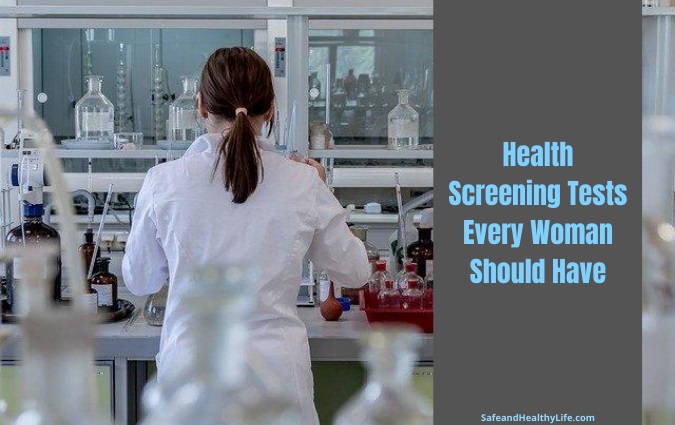
Often at your visits to the hospitals, you might have seen more females waiting for their turn than males. If you observe a little more, you will see that these are women in their 40s or 60s.
It is a common practice among many females, that once they feel better after a particular treatment, they do not revisit the doctor. Even if it is a housewife or a working woman, they often visit hospitals when things are beyond their threshold.
When women enter their thirties, the body naturally undergoes many changes that are physiological and hormonal. The body gets a comparatively slow metabolism, thus affecting the digestion rate.
Bone issues are also common as the body cannot produce calcium or vitamins on its own. Women undergo many hormonal changes that affect their health and well-being. Staying healthy is not difficult, but it needs a person to be vigilant by having some screening tests.
Why are Screening tests necessary?
Many of us do not consider it essential, but doctors recommend that one should go for screening tests to monitor any disease or ailments when it is in treatable conditions.
Our body starts giving up warning signs when something is below or above-average values. Screening tests serve as an early diagnosis of a life-threatening disease that your doctor can treat in its early developmental stages.
You can go for standard screening tests to a laboratory that can give you an authentic and accurate diagnosis report. People living in Central and Southern California can benefit from the services of Primex Labs for their screening tests.
As a woman, if you are unsure which screening tests you should get done, here is an essential guide for tests you should have.
1. Pap smear and pelvic exam
The body of a female is more under the influence of hormones and their effect on the body. With the menstrual cycles in function, every woman shall go for a Pap smear and pelvic exam after 21.
The Pap smear serves as a diagnostic test for the presence of cervical cancer, and pelvic exam involves physical and visual exam of a female’s reproductive organs.
Both tests can help a doctor to diagnose the existence of any cyst, fibroids, over polycystic ovarian syndrome. A woman shall get a Pap smear test every three years to keep the health in check.
2. Blood cholesterol levels
Another essential screening test that every woman should have is to assess cholesterol levels. The food we eat has good and bad fats, commonly known as LDLs and HDLs.
These are lipoproteins that have a lot to do with the content of oil in our food. Increased cholesterol levels in the blood may hinder the blood circulation or accumulation of fats around the heart, valves, and even veins.
Lipid regulation plays a vital role in lipid regulation and leads to a healthy heart.
3. Mammogram
Breast cancer falls under one of the most prominent causes of death among females.
According to doctors, females should carry out self-exam for any changes in their breast, but they should also get a mammogram at the age of forty and annually.
Mammogram serves as a screening test for the presence of breast cancer, and if it runs in the family, then they might need genetic counseling.
Breast cancers have more dangerous types that are fast spreading and related to (BRCA-1 and BRCA-2 genes). A mammogram can predict the early presence or risk of it and can save your life.
4. Diabetes
There is no specific age that will get you diabetes; there are many reasons to initiate an increased amount of insulin release in your body.
You can get gestational diabetes-related to your gestational or pregnancy periods, or you can have type 2 diabetes. When your blood glucose level is above its standard value, your body starts giving signs.
It is essential to check for your blood glucose level every three years if you are in your forties.
If you happen to be a pre-diabetic, your doctor will start the medicines to delay the onset, and if you have diabetes, then you might need drugs to keep it in control. Both scenarios can only come to the surface through screening tests.
5. Bone Density
Osteoporosis and calcium deficiency related issues are more prevalent in females. You are good to go without a test until the age of 65. Once you are 65, you might need to get your bone density screening as women at this age are more prone to weaker bones, osteoporosis, and osteoarthritis.
Women with a history of fracture, low body mass, or high medication use shall screen for this test.
6. Colonoscopy
Contrary to the belief that colon cancer develops only in men, women are also at risk. Women at the age of 50 shall consider this test to check for any abnormality in the colon.
Women with complaints of constipation or piles shall not avoid it. It is better to be safe than sorry. You can repeat this test every five years to check for colon cancer’s presence or any other symptoms.
7. Skin Check
As compared to men, women use more beauty products, which means more chemicals on your skin. Even you do take care of your skin and go to a spa or salon, do go for an annual skin check, if you are someone with moles, you shall not miss this test.
Women who stay more outdoors are at risk of developing skin cancer, and any change in moles can initiate it. A thorough skin check can also assess your melanin levels that help in the prevention of skin cancer.
8. Blood count
Females often lack nutrients that keep the body going. It is essential to go for a complete blood count every six months to see any changes in your blood cells.
Our blood cells play a crucial role in maintaining our immunity and healing our injuries or wounds. The blood screening test can detect many diseases such as anemia, thalassemia, and even HIV.
Conclusion
We can only stay healthy if our body is functioning normally, and we are aware of deficiencies and what needs to be in limit. We can only know about the hormonal or chemical changes in our bodies through screening tests.
These screening tests can save us a big deal from life-threatening diseases. It is better to get the treatment for breast cancer when the symptoms are just appearing in one single cell than going to a doctor to find out that it is at the last stage.
Life is precious, and we can only live it to the fullest if we are healthy.
About The Author:
Britney Caira is a good writer, and her primary goal is to educate readers and share quality content, She would love to write about Health and Insurance. She assures you that the readers will find her writings interesting and engaging.




